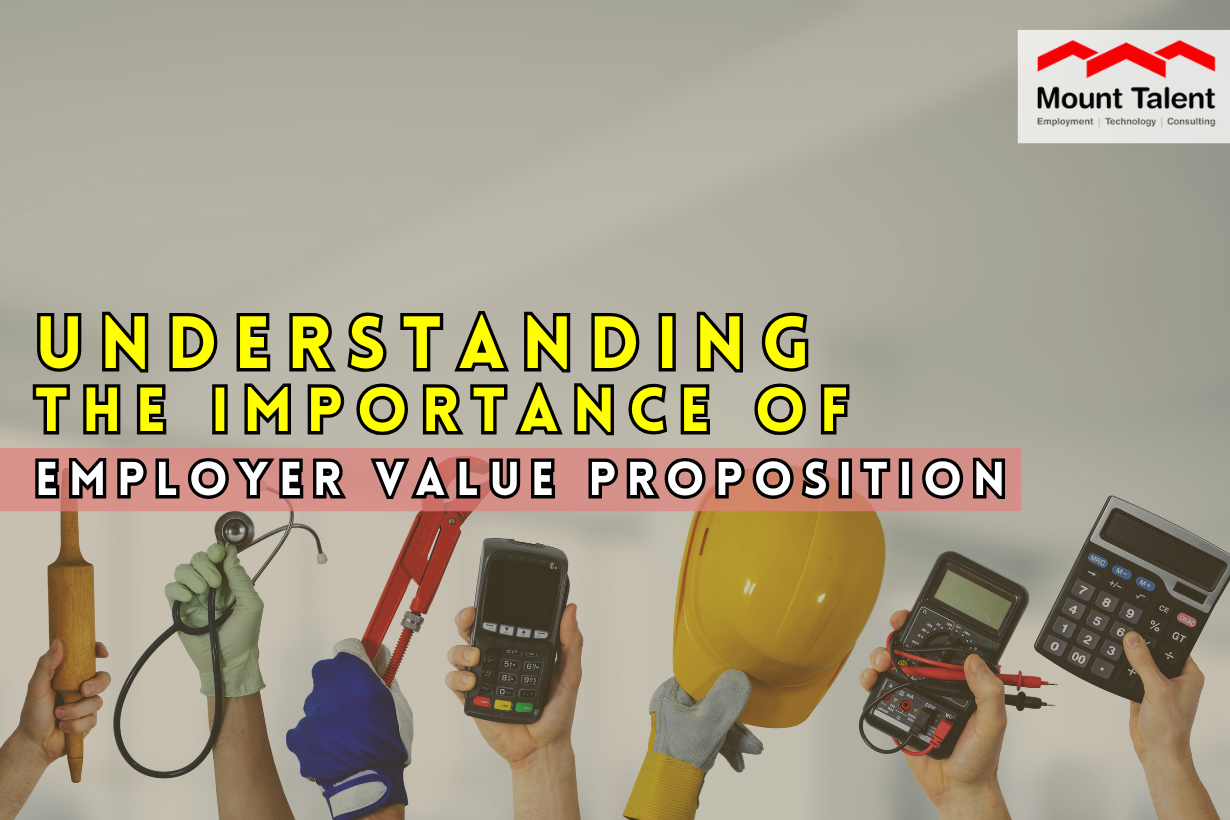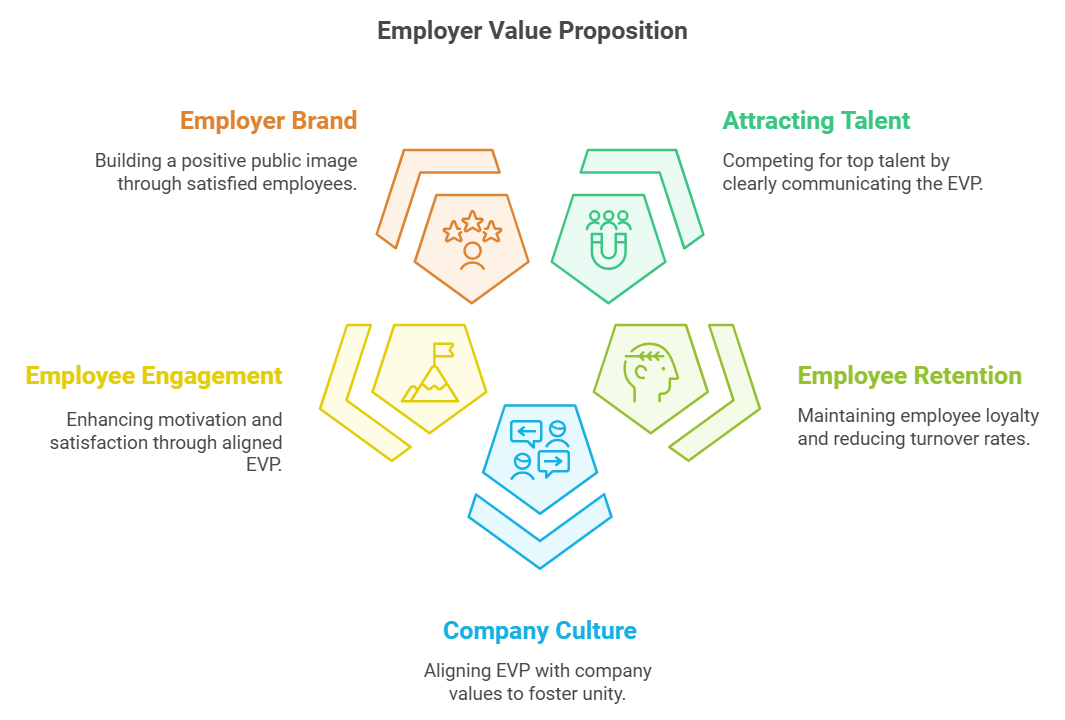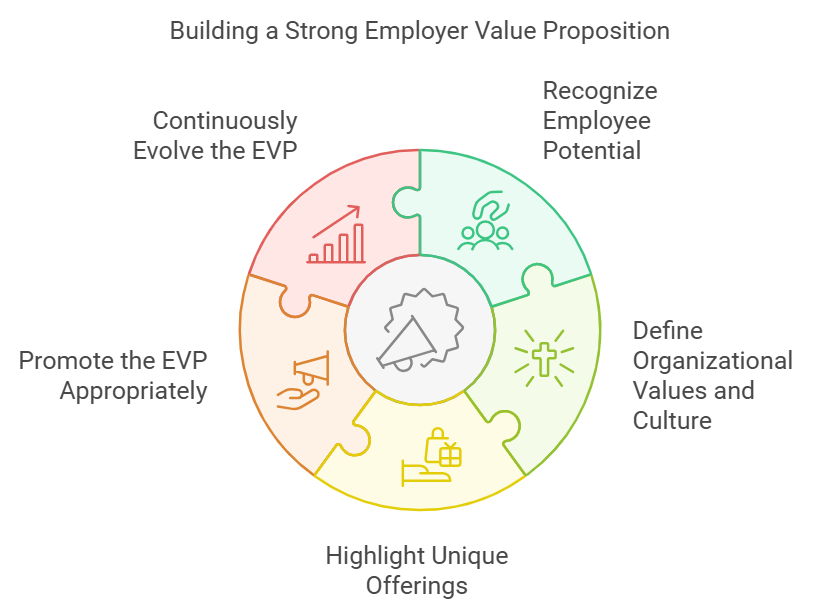
Understanding The Importance Of Employer Value Proposition (EVP)
- by Mayank Thapa
Today every organization is struggling to get the best talent due to stiff competition and therefore they require more than just a good offer package to attract and retain employees. This is the place where the notion of employer value proposition (EVP) is most necessary for consideration. Thus, an EVP distills a specific organization’s employee proposition into the benefits and values that the employee wants and needs that a particular organization can offer to attract specific talented or interested candidates and to retain present employees. What is EVP, why is it important, and how can organizations create an EVP for their employees in order to create a workforce that is loyal and motivated is the focus of this article.
What is an Employer Value Proposition (EVP)?
The employer value proposition can be understood as the message an organization sends to its employees. In fact, the total reward system covers the full spectrum of what an organization provides to an employee in terms of pay packages, the organization’s working culture, promotions, and the company’s ethics. In other words, what is EVP may be described as the portfolio of attributes that distinguish an organization as an employer of choice. An effective value proposition for employees is one that can transform extremely talented candidates into worker bees in organizations in addition to creating loyalty, identification, and a high level of job satisfaction among the existing workers.
Why is Employer Value Proposition Important?

1. Attracting Top Talent
A strong employer of record value proposition is critical to competing for talent in today’s Labor Market. When the potential candidates know what is EVP, the arguments are clear and appealing, and they come forward and get involved in the recruiting process. It is logical therefore for any business to develop a clear verbal or written statement of the value proposition for the workers, knowing that the company has something special that makes the clients be attracted to the business with people who have the right values and attitudes.
2. Enhancing Employee Retention
It is wise to understand that the main goal of an employer value proposition is not merely recruitment but maintaining the employee. Loyalty is following, people who remain within the organization like those about which it stands, and such things as offered on its Web site. A clear and appealing value proposition for the employees is dangerous in increasing the organizational commitment which is vital in avoiding high turnover rates in an organization.
3. Strengthening Company Culture
The idea encompassed in any given employer value proposition statement aligns with the culture and values of the company. By defining what is EVP, organizations can demonstrate what type of culture is valued, be it flexible working, collaboration, empowered idea generation, or being able to get involved in community projects. That clears up the company and fosters corporate unity through a workforce that is of one mind and commitment.
4. Improving Employee Engagement
That is why those people who find a relevance of their organization’s value proposition for employees, are more engaged and motivated. Effectively, when there is an EVP that has a strong fit for the aspirations of employees professionally as well as individually, then the results will be higher levels of satisfaction, productivity, and engagement. The employer value proposition hereby provides the workers with meaning and similarity and hence should be aligned in the long-run corporate strategy.
5. Building a Positive Employer Brand
In the creation of the employer brand, a good employer value proposition goes a long way in developing and sustaining the employer brand with the general public, and hence the company brand is boosted. When employees know what is EVP and are happy with their company, they promote the company’s image to the outside world acting as brand ambassadors for the company in question. In creating and maintaining a positive employer image the aim is to leave a permanent impression on the minds of existing and prospective workers.
Components of an Effective Employer Value Proposition
An ideal employer value proposition is made of the following components. All of them play a role in crafting an appealing value proposition to present to employees and address their concerns and desires.
1. Compensation and Benefits
Although compensation may not single-handedly explain what is already meant by the term EVP, it forms a core component of the employer value proposition. A competitive salary structure combined with such fringe benefits as medical coverage, pension or social security, and bonuses presents the core of a compelling value offering.
2. Career Development and Business Promotions
Skills development and training are some of the best components of a good employment brand proposition. Those that provide training, coaching, and promotion bear an indication of the company’s readiness to offer long-term support to the employees. To many, having a defined career ladder within an organization is a strong selling proposition to workers.
3. Work-Life Balance
The value of diversity or flexibility and work-life balance has become an important factor that an organization’s employees consider when in a modern organization. Fewer weekly working hours, options to work from home, and other forms of paid leave push employers closer to the employees who seek equilibrium between professional and personal life.
4. Company Culture and Values
There is one characteristic of the employer value proposition, which is company culture. If an organization is supportive, inclusive, and fosters innovation it makes its value proposition to the employees nearly impossible to match. The positive work environment should provide an easy way for the employees to get in touch with other people within their workplace which in turn may lead to high morale and productivity.
5. Recognition and Rewards
Valued employees tend to remain focused and motivated. In fact, rewards and recognition actual and perceived, structural and cultural are central to crafting a robust employer value proposition. Key elements in this value proposition include Regular staff incentive programs, incentives based on exemplary performance, and public acknowledgment where employees are rewarded for the roles they play in the organization’s success.
Crafting a Compelling Employer Value Proposition
Employer branding to establish an employer value proposition is therefore a strategic process. Here are the steps involved:

1. Recognize Employee Potential
The first strategy for developing an employer value proposition is identifying the employer’s needs and wants. These surveys, focus groups, and interviews can be done in the organization to know what is important to the organization’s workforce. This feedback will be of immense value in attempts to design and develop an effective value proposition that would be compelling to the employees.
2. Define Organizational Values and Culture
An EVP should mirror the organization in one way, shape, or form. In defining what is EVP, organizations have to give perspective to their mission, vision, and culture in that company. Thus the employer value proposition must convey the employer brand and culture in a way that will appeal to the wanted target audience.
3. Highlight Unique Offerings
An effective employer value proposition should always bring out the promise that the employer is offering that is special and different from the other employers. This could be extending from new and creative working practices to superior special privileges for employees. The importance here is to create a value proposition for the employee that will differentiate and make the company unique.
4. Promote the EVP Appropriately
The message needs to be well communicated once developed to reflect the employer value proposition to employers. This is through the company website, job advertisements, social networks, and company newsletters. It means that one should remain focused and unswerving to communicate the core message to the employees and the candidates regarding the EVP and its importance.
5. Continuously Evolve the EVP
An employer value proposition should therefore be ever-changing with employee’s expectations and market trends. Reviewing and updating the propositions for employees frequently make it relevant and competitive for organizations, so as to attract and retain talents in a given market.
Evaluating the effectiveness of Employer Value Proposition
To get the picture of how the employer value proposition affects the organizations, the following outcomes need to be calculated:
- the level of involvement and satisfaction
- retention rates’ perspectives
- company’s reputation and the quality of attractants.
Additional discussions and surveys can help assess the performance, or lack thereof of the value proposition for employees.
Conclusion
Effective Employer Value Proposition is an important component in the process of attracting, maintaining, and engaging employees. Knowing what exactly EVP is and creating powerful propositions can help organizations develop a devoted staff that has a positive impact on an organization’s future development. In the ongoing talent war, the creation of an impressive, credible, and compelling EVP will serve as a competitive edge. Companies seeking help in creating their coherent and efficient EVP can find valuable information at mounttalent.com.
Frequently Asked Questions
- What is an employer value proposition (EVP)?
Answers- An employer value proposition (EVP) is the sum total of those assets that an organization provides to its human capital recruitment and retention initiatives.
- How does EVP benefit employee retention?
Answers- A good employer value proposition makes employees committed to their employers, due to its ability to consider their needs hence increasing retention.
- What is included in a value proposition for employees?
Answers- The components of a value proposition for employees are pay and incentives, training and development, hours, organizational culture, and appreciation.
- Why is company culture important in EVP?
Answers- Culture is a representation of the organization’s beliefs, and actions, and being able to create a culture that is accepting of the employee leads to an attractive employer value proposition.
- How often should EVP be updated?
Answers- An employer value proposition should be periodically revised and just as often updated due to the constantly shifting employee expectations and the demand in the market.
Today every organization is struggling to get the best talent due to stiff competition and therefore they require more than…
